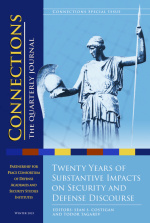By employing historical institutionalism, this article argues that anthropogenic risks (i.e., climate change and the COVID-19 pandemic) serve as a critical juncture for NATO in reorienting its sustainability strategies in response to climate fluctuations and potential insecurity arising from resource depletion. During the Cold War, NATO’s main objective was to deter threats from states, mainly the Soviet Union. At the beginning of the twenty-first century, the Alliance turned to non-state actors (e.g., Al-Qaida, Somali pirates, and Russian hackers). Then, climate change and COVID-19 emerged as global security risks from natural, environmental phenomena. NATO had incrementally sought to address the threats from climate change, but COVID-19 served as an impetus to acknowledge insecurity caused by neither states nor non-state actors. The pandemic represented the Alliance’s first significant mobilization of military assets on a regional (i.e., European level), for a sustained period, in response to a unique risk. Based on this experience, NATO needs a sustainable strategy to acknowledge anthropogenic risks and to prepare for future climate-related fluctuations and insecurity.
Reviewed article
NATO and Anthropogenic Strategic Security
Article statistics
Bibliography
Statista, “Area Burned by Wildfires in Greece from 2009 to 2022,” August 22, 2022, https://www.statista.com/statistics/1264709/area-burned-by-wildfire-in-greece/
Mert Ozkan and Ezgi Erkoyun, “Turkish Wildfires Are Worst Ever, Erdogan Says, as Power Plant Breached,” Reuters, August 4, 2021, https://www.reuters.com/world/middle-east/fire-near-turkish-power-plant-under-control-local-mayor-2021-08-04/
Center for Disaster Philanthropy, “2021 International Wildfires,” October 25, 2021, https://disasterphilanthropy.org/disasters/2021-international-wildfires/
Angela Giuffrida, “‘All That’s Left Are Ashes’: Italian Communities Count Cost of Wildfires,” The Guardian, August 13, 2021, https://www.theguardian.com/world/2021/aug/13/all-thats-left-are-ashes-italian-communities-count-cost-of-wildfires
Will Steffen et al., “The Trajectory of the Anthropocene: The Great Acceleration,” The Anthropocene Review 2, no. 1 (2015): 81-98, https://doi.org/10.1177/2053019614564785
Will Steffen et al., “Trajectories of the Earth System in the Anthropocene,” Proceedings of the National Academy of Sciences of the United States of America 115, no. 33 (August 2018): 8252-8259, https://doi.org/10.1073/pnas.1810141115
John Podesta and Peter Ogden, “The Security Implications of Climate Change,” The Washington Quarterly 31, no. 1 (Winter 2007-08): 115-138, http://muse.jhu.edu/article/224705
Göran Tomson et al., “Solidarity and Universal Preparedness for Health after Covid-19,” BMJ 372, 59 (2021), https://doi.org/10.1136/BMJ.N59
Michael C. Williams, “The Continuing Evolution of Securitization Theory,” in Securitization Theory: How Security Problems Emerge and Dissolve, ed. Thierry Balzacq (London: Routledge, 2010), 212-222, https://doi.org/10.4324/9780203868508
Ulrich Beck, Risk Society: Towards a New Modernity (London: Sage Publishing, July 1992), 21.
Adam Burgess, Jamie Wardman, and Gabe Mythen, “Considering Risk: Placing the Work of Ulrich Beck in Context,” Journal of Risk Research 21, no. 1 (2018): 1-5, https://doi.org/10.1080/13669877.2017.1383075
Marc A. Levy, “Is the Environment a National Security Issue?,” International Security 20, no. 2 (Fall 1995): 35-62, https://doi.org/10.2307/2539228
S.C. Lonergan, ed., Environmental Change, Adaptation, and Security (Amsterdam: Springer, 1999), https://doi.org/10.1007/978-94-011-4219-9
Thomas F. Homer-Dixon, Environment, Scarcity, and Violence (Princeton, MA: Princeton University Press, 2001).
Joshua W. Busby, States and Nature: The Effects of Climate Change on Security (Cambridge: Cambridge University Press, 2022).
Cameron Harrington, “The Ends of the World: International Relations and the Anthropocene,” Millennium: Journal of International Studies 44, no. 3 (2016): 478-498, https://doi.org/10.1177/0305829816638745
UN Statistics Division, “How COVID-19 Is Changing the World: A Statistical Perspective, Volume II” (New York: Committee for the Coordination of Statistical Activities, 2020), https://unstats.un.org/unsd/ccsa/documents/covid19-report-ccsa_vol2.pdf
Edward C. Holmes, “COVID-19 – Lessons for Zoonotic Disease,” Science 375, no. 6585 (March 2022): 1114–1115, http://doi.org/10.1126/science.abn2222
Anand Menon and Jennifer Welsh, “Understanding NATO’s Sustainability: The Limits of Institutionalist Theory,” Global Governance 17, no. 1 (2011): 81-94, https://doi.org/10.1163/19426720-01701006
Celeste A. Wallander, “Institutional Assets and Adaptability: NATO after the Cold War,” International Organization 54, no. 4 (2000): 705-735, https://doi.org/10.1162/002081800551343
Seth A. Johnston, How NATO Adapts: Strategy and Organization in the Atlantic Alliance since 1950 (Baltimore: Johns Hopkins University Press, February 2017), 3.
NATO, “Operations and Missions: Past and Present,” June 14, 2022, www.nato.int/cps/en/natohq/topics_52060.htm
Stanley R. Sloan, Defense of the West: NATO, the European Union and the Transatlantic Bargain (Manchester: Manchester University Press, 2016).
“How NATO Is Shaping up at 70,” The Economist, March 14, 2019, www.economist.com/special-report/2019/03/14/how-nato-is-shaping-up-at-70
NATO, “Military Medical Support,” June 2, 2022, https://www.nato.int/cps/en/natohq/topics_49168.htm
Thierry Tardy, ed.,“COVID-19: NATO in the Age of Pandemics,” NDC Research Paper (Rome: NATO Defense College, 2020), https://www.ndc.nato.int/research/research.php?icode=11
Betsy McKay, Jennifer Calfas, and Talal Ansari, “Coronavirus Declared Pandemic by World Health Organization,” The Wall Street Journal, March 11, 2020, www.wsj.com/articles/u-s-coronavirus-cases-top-1-000-11583917794
Martin Bentham, “Italy and Spain Trigger Emergency NATO Plan to Boost Medical Kit,” The Evening Standard, March 30, 2020, https://www.standard.co.uk/news/health/italy-and-spain-trigger-emergency-nato-plan-to-boost-medical-kit-a4401591.html
NATO, “Coronavirus Response: Turkish Medical Aid Arrives in Spain and Italy,” April 1, 2020, https://www.nato.int/cps/en/natohq/news_174826.htm
NATO, “Coronavirus Response: NATO Supports Luxembourg, Increasing Hospital Capacity,” March 31, 2020, https://www.nato.int/cps/en/natohq/news_174783.htm
NATO, “Coronavirus Response: NATO Allies Cooperate with Private Sector and Academia, Making 3D Printing an Essential Contribution in the Fight against COVID 19 Pandemic,” April 1, 2020, https://www.nato.int/cps/en/natohq/news_174797.htm
NATO, “Allied Plane with Medical Supplies to Fight Coronavirus Crisis Arrives in Slovakia,” March 25, 2020, https://www.nato.int/cps/en/natohq/photos_174530.htm
NATO, “NATO and COVID-19,” March 25, 2022, https://www.nato.int/cps/en/natohq/174592.htm
Ibrahim Al-Marashi and Amar Čaušević, “NATO and Collective Environmental Security in the MENA: From the Cold War to Covid-19,” Journal of Strategic Security 13, no. 4 (2020): 28-44, https://doi.org/https://doi.org/10.5038/1944-0472.13.4.1804
Beatrice Mosello et al., “Spreading Disease, Spreading Conflict? – COVID-19, Climate Change and Security Risks” (Berlin: Adelphi, 2020), https://www.adelphi.de/en/publication/spreading-disease-spreading-conflict
Duncan Depledge and Tobias Feakin, “Climate Change and International Institutions: Implications for Security,” Climate Policy 12, sup01 (2012): S73-S84, https://doi.org/10.1080/14693062.2012.728794
NATO, “Strategic Concept 2010” (Lisbon, November 2010), https://www.nato.int/cps/en/natohq/topics_82705.htm
Amar Čaušević, “Facing an Unpredictable Threat: Is NATO Ideally Placed to Manage Climate Change as a Non-Traditional Threat Multiplier?” Connections: The Quarterly Journal 16, no. 2 (2017): 59-80, https://doi.org/10.11610/Connections.16.2.04
Neta C. Crawford, “Pentagon Fuel Use, Climate Change, and the Costs of War” (Providence: Brown University, Watson Institute for International and Public Affairs, 2019), https://watson.brown.edu/costsofwar/papers/ClimateChangeandCostofWar
Julijus Grubliauskas, “NATO’s Energy Security Agenda,” NATO Review, May 9, 2014, https://www.nato.int/docu/review/articles/2014/05/09/natos-energy-security-agenda/index.html
NATO Parliamentary Assembly, “Resolution 427 on Climate Change and International Security” (Brussels: NATO Parliamentary Assembly, 2015), https://www.actu-environnement.com/media/pdf/news-25462-resolution-otan-2015.pdf
NATO News, “NATO Secretary General at Sciences Po Youth and Leaders Summit,” YouTube, January 18, 2021, https://www.youtube.com/watch?v=Kcva85RoASk
International Military Council on Climate and Security, The World Climate and Security Report 2020, February 13, 2020, https://imccs.org/report2020/
NATO, “NATO Climate Change and Security Action Plan,” June 14, 2021, https://www.nato.int/cps/en/natohq/official_texts_185174.htm
NATO, “NATO Releases Its Climate Change and Security Impact Assessment,” June 28, 2022, https://www.nato.int/cps/en/natohq/news_197241.htm
NATO, “NATO 2022 Strategic Concept,” adopted by Heads of State and Government at the NATO Summit in Madrid, June 29, 2022 (Madrid, 2022), https://www.nato.int/nato_static_fl2014/assets/pdf/2022/6/pdf/290622-strategic-concept.pdf
Government of Canada, “NATO Climate Change and Security Centre of Excellence,” June 30, 2022, https://www.international.gc.ca/world-monde/international_relations-relations_internationales/nato-otan/centre-excellence.aspx?lang=eng

